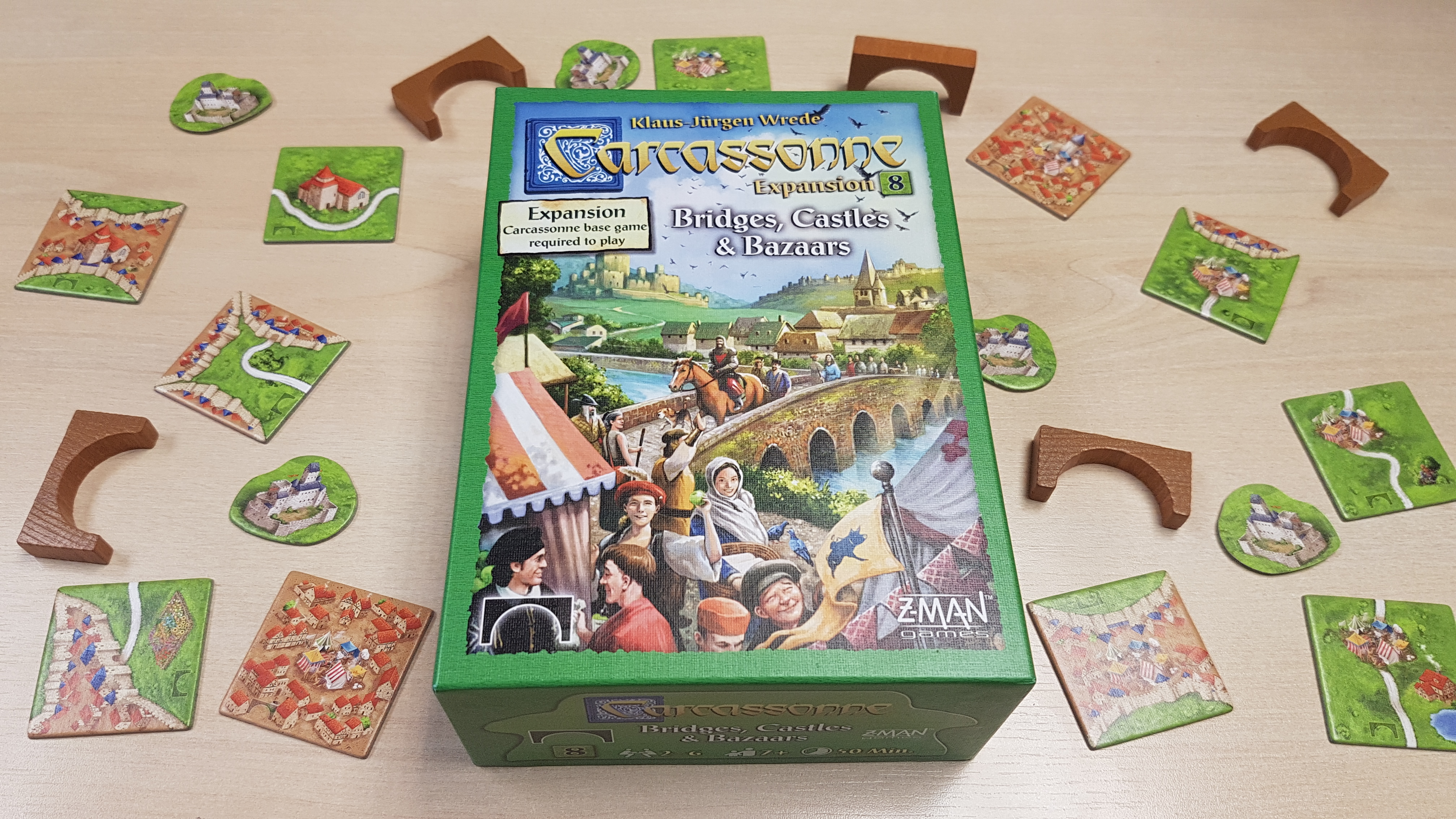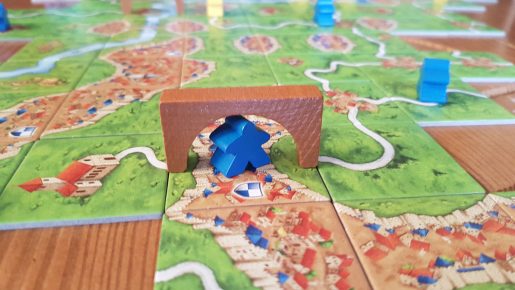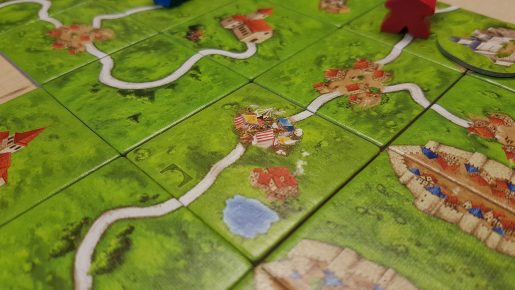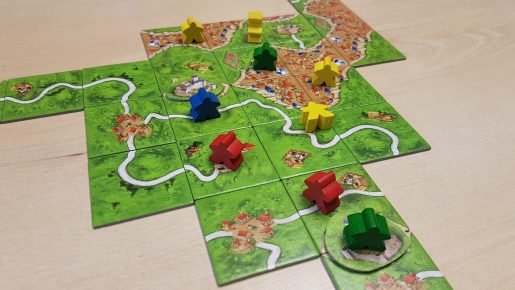Carcassonne: Expansion 8 – Bridges, Castles and Bazaars, originally released back in 2010, has just seen a reprinting from Z-Man Games. Coming from designer Klaus-Jürgen Wrede this eighth expansion adds in 3 separate modules, for use with the base game of Carcassonne. Whether it’s arching bridges, small castles that appear or new bidding mechanics the expansion adds new elements to the experience. However, do they enhance the famous tile placement game? Let’s find out!
Each module can be added into the base game either together or completely separately, with or without other expansions; the choice is left 100% up to the players. The first module bridges doesn’t add new tiles to the game; instead tile wide wooden arches are included in the box. Depending on the player count each player starts with a set number of bridges. For reference, in a 2 – 4 player game everyone gains 3 bridges and in 5 – 6 player games each player gains 2 bridges.
Bridges can be placed after a tile to extend a road directly over the placed tile or and adjacent tile, either horizontally or vertically. The placement limitation is that the “road” must continue the illustration and both ends of the bridge must cover fields and no other features. Although, the bridge itself can arch over any feature. In terms of scoring they are counted as a regular road piece and therefore are never returned to the player once they have been put into play, so must be used wisely.
Bridges slightly remove some of the luck of the draw, seen in the base game, of drawing tiles from the pile. This is due to the bridges opening up options for players even when the tile itself wouldn’t normally give them a great opportunity. The wooden arches pop from the board of tiles, giving the game slightly more to look at, especially when a few them are strung together over a couple of turns.
The next module of Castles introduces small, half tile sized, tokens that can be added to the board. As with the bridges, Castles are also distributed at the start of the game depending on the player count. The same number are distributed, making it simpler to remember: 3 castles in a 2 – 4 player game and 2 castles in 5 – 6 player games. Whenever a player completes a “small” 4-point city the owner gets the choice to instead of scoring and gaining the meeple back to turn the city into a castle by adding the tile onto the board – spanning the edge of the two tiles.
Whenever the next feature, that is at least partially present on either of the two tiles the castle spans or the two tiles to either side, is scored, no matter what it is, the castle awards the owner the same number of points. This works with cities, roads, monasteries and even other castles, so the point return can significantly increase from the 4 points the player would have earnt for the small city. At the end of the game any meeples left on a castle score nothing, though castles do count towards field values – offering a consistent 4 points to farmers.
The final addition of the expansion is the Bazaar, which adds into the game 12 new land tiles, all marked with a translucent arch symbol. Whenever a tile is drawn with a bazaar on it the tile must be placed as normal, with meeple placement allowed on other features on the tile aside from the bazaar. Once placed the bazaar tile triggers a round of bidding. A number of land tiles, equal to the number of players, are turned face up from the pile and the player to the left of the active player starts the bidding off by choosing a tile and naming a price in points, becoming the auctioneer.
Going in player order around the table players can then decide whether or not to increase the bid. Once everyone has submitted a bid the auctioneer chooses to either buy or sell based upon the highest bid. If they are the highest bid they simply buy the tile for the quoted price, paying the associated cost from the scoreboard. If someone else has the highest bid the auctioneer pays that player the points to buy the tile or sells the tile to the highest bidder for that amount of points. After buying a tile you are out of the auction, though the bidding continues with the next player taking up the role of the auctioneer after choosing a different tile. The final tile is awarded to the remaining player for free. If no-one has any points, each player in turn simply chooses and takes a tile for free. Once everyone has a tile they are played in turn order as usual starting with the player to the left of the active player.
Especially the first time it occurs, due to players getting used to the idea, the bazaar auction can rather disrupt the flow of the game. Thankfully, their impact is lessened by the fact chain reactions are not caused by subsequent bazaars being brought and placed due to the bidding. Just when players get into the rhythm of placing a tile, maybe a meeple and scoring, along comes an auction and play comes to a halt. On top of this, because of the way the auctions work, players cannot use the common house rule of drawing their next tile at the end of their turn, slowing the pace of the game.
While it is something different, the bidding mechanics don’t truly fit in nicely with the standard gameplay of Carcassonne. There are better games out there for bidding and it dilutes the tile placement experience due to the stops and slows. This being said, the tiles themselves look nice so I’ll continue to throw them into the draw pile while excluding the auction ruleset. Castles offer the players an additional choice, with a slight risk factor making them fun to play with, for the sake of only a few additional rules. By far the best part of the expansion are the bridges, something which seem to fit the family friendly game, whilst minutely removing luck from the experience. Overall, it might not be the best expansion available for Carcassonne, though veterans might enjoy the ways it can spice the gameplay up.
[Editor’s Note: Carcassonne: Expansion 8 – Bridges, Castles and Bazaars was provided to us by Asmodee UK for review purposes. The game is currently available on 365 Games for £15.99. It is also available from local UK board game stores, find your local store here]




